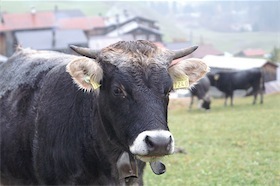Hunger and Inequality

Heavily subsidized Swiss cow (cc photo by LKM)
Tom Philpot goes long and global food shortages, but reaches a conclusion I'm not sure I entirely share:
But there's no reason to plunge into Malthusian anguish about a coming global population plunge. A lot people across the world are thinking hard about how to grow sufficient food without sucking dry the global water supplies or burning through fossil fuels like there's no tomorrow. For a bit of hope after imbibing a dose of Brown's bitter truth, check out WorldWatch's State of the World 2011 report, which surveys interesting sustainable-agriculture projects across the globe.
I agree that we don't need to plunge into Malthusian anguish either. And there's a more fundamental reason for that, actually. Global population is predicted to peak at around 9 billion people and I'm pretty confident we easily grow enough food to feed that many people right now. That's because eating meat is an extremely inefficient way of turning vegetation into food. If everyone gave up meat—or even just ate pork instead of beef—we'd have a big grain glut. The issue, of course, is that people don't want to give up meat. On the contrary, as the world gets richer people are shifting toward incorporating more meat into their diets. That, in turn, creates a kind of food chain gentrification problem for those individuals who aren't, personally, getting richer since it pushes up the price of grain.
The optimistic reading of that is that for all our horrible mismanagement of global water resources, it's really really unlikely that we'll reach a state of affairs where we're actually unable to produce the requisite calories to feed the world's population. The pessimistic reading is that producing enough food isn't enough—rapid growth in a handful of large poor countries can produce terrible consequences for poor people in other, still-poor countries.


Matthew Yglesias's Blog
- Matthew Yglesias's profile
- 72 followers



